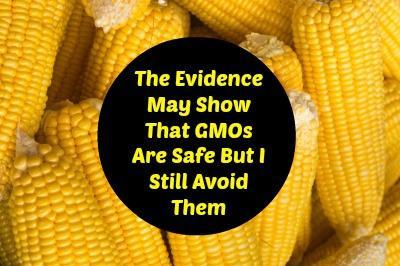 My family avoids eating GMOs. I can’t say we NEVER eat them. We had GMO corn taco shells this week and cookies from a local bakery that almost certainly uses conventional ingredients. A recent trip to a nearby burger joint was what our family refers to as a “crap fest.” It was delicious! Healthy? Well… uh… it was delicious. As a rule, though, we go for food that is as close to all-natural as we can get it, even though that means our grocery budget is higher than average and we have to make cuts in other areas to pay for our food.
My family avoids eating GMOs. I can’t say we NEVER eat them. We had GMO corn taco shells this week and cookies from a local bakery that almost certainly uses conventional ingredients. A recent trip to a nearby burger joint was what our family refers to as a “crap fest.” It was delicious! Healthy? Well… uh… it was delicious. As a rule, though, we go for food that is as close to all-natural as we can get it, even though that means our grocery budget is higher than average and we have to make cuts in other areas to pay for our food.
I’ve been working on this post for quite a while now, trying to put together the reasons we make the choice to eat a GMO-free (more or less) diet. This morning, Wanda from Minnesota Farm Living posted this link on her Facebook page and it was just the motivation I needed to tie all this together and post it.
Wanda and I are on opposite sides of the GMO debate but I have immense respect for her. She runs a farm that is clean and humane. She goes out of her way to know the latest research on how to keep her animals healthy and, therefore, provide healthy meat to the public. Also, she has been endlessly patient with me as, for nearly a year now, I have been occasionally pestering her with questions about why so many farmers make the choices they do when it comes to bio-tech if it’s “SO OBVIOUS” to Joe Public that bio-tech is evil. She helps me see that my viewpoint isn’t always the only one and that, as a consumer but not a producer, I don’t always understand the bigger picture.
The article she posted today, entitled, “How Scare Tactics on GMO Foods Hurt Everybody,” was an interesting read and I agree with a lot of what they said. The author, Prof. Pamela Ronald, was speaking specifically in reaction to a new bill that has been passed in Vermont, requiring the labeling of GMO foods.
Let’s start with the common ground.
Prof. Ronald says, “…farmers’ use of GMO crops has reduced by a factor of 10 the amount of insecticides sprayed on corn over the last 15 years… decreased carbon dioxide emissions…”
I live in a rural area and I have asked dozens of farmers why they buy GMO seed. Universally they say it reduces the amount of pesticide they have to use and the amount of gas they would use applying it to their field. Additionally, fossil fuels are burned in tilling fields and GMO crops require less (sometimes no) tilling. I would add that several of them go a step further and say that using GMO seed has decreased their topsoil erosion as well. So, in these ways, GMO crops are a big benefit to the environment.
She also states this:
“The bill is a contradictory hodgepodge of requirements and exemptions. It doesn’t require labeling for cheese made with genetically engineered enzymes, or red grapefruit developed through radiation mutagenesis. It doesn’t require labeling for animals that have been fed GMO crops, or for crops sprayed with carcinogenic compounds. The law doesn’t require crops sprayed with the organic pesticide Bt to be labeled, but crops genetically engineered to produce Bt must be labeled, and so must certain types of hybrids (including triticale, which can be found in most natural-food stores).”
To which I reply, with a sigh, “Yup. That’s government for you.”

There is this statement: “So the law… won’t give consumers access to food that’s… less “corporate.”
True. Organics and natural food is some seriously big business in America these days. Pretty much every major food manufacturer has a branch or “child company” that sells organic products. In fact, the cost of organic certification is so prohibitive that there are very few small farms that can afford it. If you want to avoid doing business with Corporate America you need to grow your own food or buy from a neighbor who does.
She concludes with this:
“So let’s label food, but let’s do it right. Instead of adding a general label about the process with which a plant variety was developed, let’s use labels that provide details about how the crop was grown and what is actually in the food. Let’s apply these labels to all foods, so consumers can make comparisons and draw their own conclusions about the risks and benefits of each seed or farming practice. Let’s create a national sustainable agriculture standard that is science-based and that has as its goal the health and well-being of consumers, farm workers, and the environment.”
Yes, yes and yes! I couldn’t possibly agree more! What a lovely idea! Let’s do it!

In the meantime…
Did you notice that the quotes, above, have a lot of pieces taken out? Those are the parts that are, for me, not common ground.
Right off the bat she says that there is not “a single credible report” that raises issues about the health consequences of GMOs.
If you click over to the first post I ever wrote on this topic you will find links to several reports from all over the world that raise concerns over everything from decreasing fertility rates to Leaky Gut Syndrome. Some of them come from more credible sources than others but it is important to remember in any hot topic debate that one side can almost always find some reason to discredit the other.
For instance, I could try to discredit Prof. Ronald by mentioning that she makes her living by producing and promoting GMO products so it is in her personal best interest to put the best possible face on bio-tech. Is she knowledgeable? No doubt she knows so much more than I do about all of this it’s laughable. Is she unbiased? Not a chance. Does that mean she lacks credibility? I guess that’s up to you to decide.
She points out that these products have been widely consumed for 30 years now with no ill effects.
She could be right. Presumably, if you’re reading this, you’re still alive and well enough to read. I wonder though… We are told there is an obesity epidemic. Severe food allergies are more common than ever. Children have higher rates of respiratory illness than ever before. Adults are suffering from chronic pain and illness at younger ages and more severely than previous generations. Mental illness is on the rise. Autism is on the rise. We are not a society that has been experiencing improved health in the past generation.
Is that because of GMOs?
I don’t know and neither does anyone else.
It certainly seems prudent, though, to consider that ONE of the MAJOR changes in the world in the last generation has been the introduction of genetically modified food.
She hails GMOs for reducing food costs and insists that labeling will increase them.
Uhm… has she been grocery shopping lately?! In what world is food getting cheaper?!
She argues that GMOs enhance biological diversity.
I would argue that buying ONE type of seed from ONE company does the exact opposite. Further, there are side-effects of Round-up Ready Seed. One example that comes to mind is the reduction of milkweed growing in soy bean fields. Great news for soy bean farmers. Bad news for the pollinators who live primarily off of milkweed. If the pollinators die off a massive portion of the food on this planet goes with them. That is not a good thing for biological diversity!

That’s true. If you looked at food from 1,000 years ago it would barely be recognizable to you. We have domesticated and cross-bred and hybridized everything. We’ve been doing it for as long as we, as a species, have been intentionally growing our own food.
Here’s the difference, IMHO. Keep in mind, I am not a scientist. I never claimed to be. If you come back at me with a line about aminopeptides or some such thing I won’t understand a word you are saying. I’m just drawing on a decent under-graduate education and a LOT of reading on this topic.
Let’s say, hypothetically, that you have a black cow who is an awesome milk producer and a white steer who is totally tolerant to the coldest conceivable temperatures. You might decide to play Cupid in the pasture and see if you can’t come up with a spotted baby cow who grows up to be one extremely hardy milk-making beast. Congratulations! You just manipulated the gene pool.
Now, let’s say your black cow almost drowns one day because she fell into the river that runs through your pasture. You decide to take one of her ovum, extract the DNA, splice it with the DNA of a fish and create a cow-fish that is a great milk producer and has the ability to breath through gills.

That’s the difference (in ridiculous, over-simplified terms) between the genetic manipulation that has been going on for centuries and Genetically Modified Organisms.
Is the milk from the cow-fish healthy? Maybe.
Do scientists in the year 2014 have a strong enough handle on the workings of DNA and the effects of food on overall health to guarantee that cow-fish make healthy milk? Hmmm… well, have they definitively answered what role DNA plays in cancer? Mental illness? Diabetes? Can they “fix” autism or down syndrome? Can they even, with 100% accuracy that never fails, trace the genetic lineage of humans? They’re getting there. The amount of knowledge and the understanding of practical application increases every day, but the science of genetics is not perfectly well developed yet.
Add to that the track record of foods that were once deemed not only acceptable but hailed as better than anything from nature – they range from cocaine to saccharine to trans-fats. “All doctors agree this is safe,” they said. ”There is no evidence that it’s harmful,” they said. But now we know better.
Pile on a healthy dose of Big Biotech being in bed with the lawmakers, the pharmaceutical companies and everyone else who stands to make a dollar.
Toss in a dash of truly bizarre controversy surrounding scientists formerly hailed as THE experts in the field (thinking of Dr. Don Huber, specifically).
And, just for good measure, throw in a pinch of, “The hippie in me just can’t trust a company like Monsanto,” (I never claimed to not have a few biases of my own!),
and now you have the reason why I still avoid GMOs, even though the evidence may show that they are safe.
*** I didn’t provide many links to research or further reading in this post because much of what I was drawing on came from what I’ve learned in the past, when doing research for the post, “What I Learned About GMOs From 9 Farmers, A Monsanto Employee and A Whole Bunch of Reading.” If you want more information I strongly encourage you to head over there and click through to the various links on both sides of the debate. This is not a cut-and-dry issue and there is a great deal to be considered when making the right choices for yourself and your family!***
Are you, too, seeking to save the earth, promote world peace and raise productive citizens without expending too much effort?
Why not follow Lazy Hippie Mama by email, Facebook, Google+, Twitter or Instagram to get all the updates?
If we work on our goals together, they may be a little easier to achieve!

